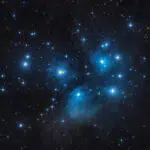Matariki is celebrated every year in late June or early July in New Zealand to celebrate the first rising of the Pleiades star cluster. Though dates vary from year to year, this year, Matariki will be celebrated on July 10. ‘Matariki’ is the Maori word for the cluster of stars known as the ‘Pleiades.’ The celebrations mark the beginning of a new year in Mãori culture. The first celebration of Matariki as a government-declared public holiday takes place in 2022.
History of Matariki
The name ‘Matariki’ is the Maori name for the cluster of stars called the ‘Pleiades,’ otherwise known to Western astronomers as ‘Messier 45’ (M45). ‘Matariki’ is also the short form of the phrase ‘Ngã mata o te ariki o Tãwhirimãtea,’ which means ‘the eyes of the god Tãwhirimãtea.’ The rising of the star cluster was used to mark the start of a new year. Matariki was traditionally a time to observe the stars and predict the harvest, mourn the dead, and make an offering of food for replenishing the stars. It was also a time to regale and educate young ones with the ancient lore of the forest and land.
Due to the wintery weather, the viewing of Matariki was spread over three to four nights so that the stars could be seen clearly. As soon as a clear view was obtained, the celebrations could begin. The brightness of the stars was used to predict the prosperity of the planting season. The brighter the stars, the warmer the season, which consequently led to a more bountiful harvest. However, if the stars were twinkling, this was taken as a sign of bad weather. Following tradition, the dead were mourned in a ceremony called ‘te taki mōteatea,’ meaning ‘the reciting of laments.’ The ceremony involved singing and crying, alongside a recitation of names of those who had died since the last rising of the Matariki. Food was also offered to the stars.
During the 19th century, the number of Matariki celebrations declined, along with other traditional Māori practices. Thankfully, Matariki was revived in the late 20th century. In 2000, Te Rangi Huata, a representative of the Ngāti Kahungunu tribe, organized an annual Matariki festival which attracted about 500 people. Finally, New Zealand’s government has declared Matariki an official holiday, slated for its first observance on June 24, 2022.
Matariki timeline
Matariki festivities begin to decline.
Matariki celebrations are revived.
Prime Minister Jacinda Andern pledges to make Matariki a public holiday.
Matariki is declared a public holiday.
Matariki FAQs
What language do Māori speak?
Māori people speak Māori, one of New Zealand’s official languages.
What is the population of New Zealand?
New Zealand is made up of approximately five million people.
What are the ethnic groups of New Zealand?
71.8% of New Zealand people are of European descent, 16.8% are Māori, 15.3% are Asian, while the remaining 11.7% are composed of Pacific peoples and other minorities.
Matariki Activities
Perform research
Learn more about the beautiful people of New Zealand and the Māori. Getting to know more about a different culture helps to broaden your mind and increases tolerance.
Wish someone a happy Matariki
Whether they’re Māori or not, wish someone a happy Matariki celebration. This might lead to a conversation about Matariki and help spread the word.
Use the hashtag
Be a good sport and share this article with all of your family members and friends. Be sure to use the hashtag #matariki for more visibility.
5 Interesting Facts About The Maori
Hāngi is cooked under earth
A meat dish called ‘Hāngi’ is cooked on hot rocks and covered with a layer of leaves, and earth.
Māori greet differently
Unlike other cultures, Māori greet each other by touching forehead to forehead and nose to nose, a gesture that is considered to give ‘Hongi’ — ‘breath of life’ — to each other.
Every Maori tattoo is distinct
Māori tattoos have unique meanings and can be used to identify a person’s family history or social status.
Stories are often passed down orally
Until the 1800s, Māori didn’t have a written language, which is why the Maori are excellent storytellers.
Maori culture is young
The Māori people are believed to have settled in New Zealand during the 14th century, making Māori culture one of the youngest in the world.
Why We Love Matariki
Matariki is a celebration of culture
In the modern world, old traditions and cultural heritages are often left on the sidelines. Matariki is a centuries-old part of the Māori culture that deserves to be highlighted and celebrated. Our unique cultural expressions are meaningful and Matariki is a good reminder of that.
Matariki is officially recognized
Matariki is doubly enjoyable because it has now been officially recognized by the government of New Zealand. Now Matariki is a public holiday that can be openly and freely celebrated.
Matariki honors the Maori
Māori make up only 15% of New Zealand’s population. However, their positive contributions to New Zealand can’t be overemphasized. Matariki is a celebration of the Māori and their rich heritage.
Matariki dates
| Year | Date | Day |
|---|---|---|
| 2024 | June 28 | Friday |
| 2025 | June 20 | Friday |
| 2026 | July 10 | Friday |

